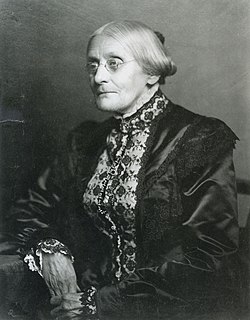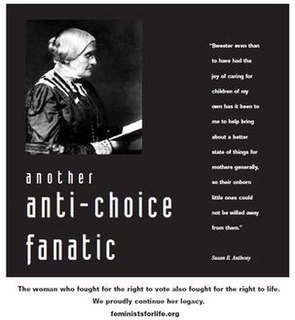Related Research Articles

Susan B. Anthony was an American social reformer and women's rights activist who played a pivotal role in the women's suffrage movement. Born into a Quaker family committed to social equality, she collected anti-slavery petitions at the age of 17. In 1856, she became the New York state agent for the American Anti-Slavery Society.

Elizabeth Cady Stanton was a leader of the women's rights movement in the U.S. during the mid- to late-1800s. She was the main force behind the 1848 Seneca Falls Convention, the first convention to be called for the sole purpose of discussing women's rights, and was the primary author of its Declaration of Sentiments. Her demand for women's right to vote generated a controversy at the convention but quickly became a central tenet of the women's movement. She was also active in other social reform activities, especially abolitionism.

The National Woman Suffrage Association (NWSA) was formed on May 15, 1869, to work for women's suffrage in the United States. Its main leaders were Susan B. Anthony and Elizabeth Cady Stanton. It was created after the women's rights movement split over the proposed Fifteenth Amendment to the U. S. Constitution, which would in effect extend voting rights to black men. One wing of the movement supported the amendment while the other, the wing that formed the NWSA, opposed it, insisting that voting rights be extended to all women and all African Americans at the same time.

The Women's Loyal National League, also known as the Woman's National Loyal League and other variations of that name, was formed on May 14, 1863, to campaign for an amendment to the U.S. Constitution that would abolish slavery. It was organized by Elizabeth Cady Stanton, its president, and Susan B. Anthony, its secretary. In the largest petition drive in the nation's history up to that time, the League collected nearly 400,000 signatures on petitions to abolish slavery and presented them to Congress. Its petition drive significantly assisted the passage of the Thirteenth Amendment, which ended slavery in the U.S. The League disbanded in August 1864 after it became clear that the amendment would be approved.
The American Woman Suffrage Association (AWSA) was a single-issue national organization formed in Boston in 1869. The AWSA lobbied state governments to enact laws granting or expanding women's right to vote in the United States. One of the AWSA most prominent leader, Lucy Stone, began publishing a newspaper in 1870 called the Woman's Journal. AWSA was co-founded by an African American woman Frances Ellen Watkins Harper, and strong women's right advocate, abolitionist, and published poet of her era. AWSA was designed as the voice of the AWSA, it eventually became a voice of the women's movement as a whole.

The American Equal Rights Association (AERA) was formed in 1866 in the United States. According to its constitution, its purpose was "to secure Equal Rights to all American citizens, especially the right of suffrage, irrespective of race, color or sex." Some of the more prominent reform activists of that time were members, including women and men, blacks and whites.

Susan B. Anthony was a leader of the American women's suffrage movement whose position on abortion has been the subject of a modern-day dispute. The dispute has primarily been between anti-abortion activists, who say that Anthony expressed opposition to abortion, and acknowledged authorities in her life and work who say that she did not.
Hester Vaughn, or Vaughan, was a domestic servant in Philadelphia who was arrested in 1868 on a charge of killing her newborn infant, and was sentenced to hang after being convicted of infanticide. The Revolution, a women's rights newspaper established by Susan B. Anthony and Elizabeth Cady Stanton, conducted a campaign to win her release from prison. The Working Women's Association, an organization that was formed in the offices of The Revolution, organized a mass meeting in New York City in her defense. Eventually Vaughn was pardoned by the governor of Pennsylvania, and deported back to her native England.
The Elizabeth Cady Stanton and Susan B. Anthony Papers project was an academic undertaking to collect and document all available materials written by Elizabeth Cady Stanton and Susan B. Anthony, two early leaders of the women's rights movement. The project began in 1982. In 1991, after nine years of research, the project published the materials it had collected as a 45-reel microfilm edition under the editorship of Patricia G. Holland and Ann D. Gordon. It included 14,000 documents gathered from 202 libraries and government offices, 671 different newspapers and other periodicals, and three dozen private collections. The microfilm edition more than doubled the sources that previously had been available.

Ellis Meredith (1865–1955) was an American suffragist, journalist, and novelist, known as the Susan B. Anthony of Colorado.
History of Woman Suffrage is a book that was produced by Elizabeth Cady Stanton, Susan B. Anthony, Matilda Joslyn Gage and Ida Husted Harper. Published in six volumes from 1881 to 1922, it is a history of the women's suffrage movement, primarily in the United States. Its more than 5700 pages are the major source for primary documentation about the women's suffrage movement from its beginnings through the ratification of the Nineteenth Amendment to the U.S. Constitution, which enfranchised women in the U.S. in 1920. Written from the viewpoint of the wing of the movement led by Stanton and Anthony, its coverage of rival groups and individuals is limited.
The Georgia Woman Suffrage Association was the first women's suffrage organization in the U.S. state of Georgia. It was founded in 1890 by Helen Augusta Howard (1865-1934). It was affiliated with the National American Woman Suffrage Association (NAWSA).

Ellen Martin Henrotin was a wealthy American society matron, labor reform activist, club leader and social reformer affiliated with social welfare and suffrage movements.
The Ohio Women's Convention at Salem in 1850 met on April 19–20, 1850 in Salem, Ohio, a center for reform activity. It was the third in a series of women's rights conventions that began with the Seneca Falls Convention of 1848. It was the first of these conventions to be organized on a statewide basis. About five hundred people attended. All of the convention's officers were women. Men were not allowed to vote, sit on the platform or speak during the convention. The convention sent a memorial to the convention that was preparing a new Ohio state constitution, asking it to provide for women's right to vote.
Charlotte Bolles Anthony, also known as Lottie B. Anthony, was an American women's rights activist and suffragist. Anthony was one of 14 women arrested with Susan B. Anthony after they illegally voted in Rochester, N.Y. on November 5, 1872.

Elizabeth Upham Yates was an American suffragist and missionary in China. She was also one of the first two women to run for statewide office in Rhode Island.

Lucy Elmina Anthony was an internationally known leader in the Woman's Suffrage movement. She was the niece of American social reformer and women's rights activist Susan B. Anthony and longtime companion of women's suffrage leader Anna Howard Shaw.

Ellen Sulley Fray was a British-born American social reformer. She formed suffrage clubs in several different states and in Canada, and became one of the district presidents of the Ohio Women's Suffrage Association.

United States v. Susan B. Anthony was the criminal trial of Susan B. Anthony in a U.S. federal court in 1873. The defendant was a leader of the women's suffrage movement who was arrested for voting in Rochester, New York in the 1872 elections in violation of state laws that allowed only men to vote. Anthony argued that she had the right to vote because of the recently adopted Fourteenth Amendment to the U.S. Constitution, part of which reads, "No State shall make or enforce any law which shall abridge the privileges or immunities of citizens of the United States."

Laura Mitchell Johns was an American suffragist and journalist. She served as president of the Kansas State Suffrage Association six times, and her great work was the arrangement of thirty conventions beginning in Kansas City in February, 1892. She also served as president of the Kansas Republican Woman's Association, superintendent of the Kansas Woman's Christian Temperance Union, and field organizer of the National American Woman Suffrage Association (NAWSA).
References
- 1 2 3 "About Us: Project Staff". The Elizabeth Cady Stanton & Susan B. Anthony Papers Project. Piscataway, New Jersey: Rutgers University. July 2009. Retrieved September 20, 2010.
- 1 2 3 "Documentary Editing: What Is It and Why Is It Needed?". The Elizabeth Cady Stanton and Susan B. Anthony Papers Project. Rutgers University. Retrieved September 20, 2010.
- 1 2 Lurie, Maxine N.; Mappen, Marc (2004). Encyclopedia of New Jersey. Rutgers University Press. p. 906. ISBN 9780813533254.
- 1 2 Gordon, Ann; Lynn Sherr (May 21, 2010). "Sarah Palin is no Susan B. Anthony". WashingtonPost.com, "On Faith" blog. Archived from the original on 13 November 2010. Retrieved October 22, 2010.
- ↑ Gordon, Ann D. (May 1967). "We Won't Go". The New York Review of Books . Retrieved March 8, 2011.
- ↑ McConaghy, Mary D.; Michael Silberman; Irina Kalashnikova (2004). "Documentation: Primary sources, compiled research data, published works". Penn in the 18th Century. Philadelphia: University of Pennsylvania, Penn University Archives & Records Center, University of Pennsylvania Library. Retrieved September 20, 2010.
- ↑ "The Selected Papers, Vol. 1". The Elizabeth Cady Stanton & Susan B. Anthony Papers Project. Piscataway, New Jersey: Rutgers University. 2008. Archived from the original on July 5, 2010. Retrieved September 20, 2010.
- ↑ "Project Publications". The Elizabeth Cady Stanton & Susan B. Anthony Papers Project. Piscataway, New Jersey: Rutgers University. July 2009. Retrieved September 20, 2010.
- ↑ Ward, Geoffrey C.; Burns, Ken (1999). "Taking Possession of the Country" . Not for Ourselves Alone: The Story of Elizabeth Cady Stanton and Susan B. Anthony. Ann D. Gordon. Knopf. pp. 163–171. ISBN 0-375-40560-7.
- ↑ Gordon, Ann D.; Buhle, Mari Jo; Schrom, Nancy E. (July–August 1971). "Women in American Society: An Historical Contribution". Radical America. 5 (4): 3–66.
- ↑ Gordon, Ann D.; Collier-Thomas, Bettye (1997). "Introduction". African American women and the vote, 1837–1965. University of Massachusetts Press. pp. 2–9. ISBN 1-55849-059-0.
- ↑ Gordon, Ann D. (Spring 2000). "Book review". Biography. 23 (2). ISSN 0162-4962.
- ↑ Gordon, Ann D. (July 2009). "The Trial of Susan B. Anthony". The Elizabeth Cady Stanton & Susan B. Anthony Papers Project. Piscataway, New Jersey: Rutgers University. Retrieved September 20, 2010.
- ↑ Gordon, Ann D. (2005). "The Trial of Susan B. Anthony". Teaching Judicial History: Federal Trials and Great Debates in United States History. Federal Judicial Center . Retrieved September 20, 2010.
- ↑ Gordon, Ann D.; Pfau, Ann; Miller, Tamara Gaskell; Banks, Kimberly J. (July 2009). "Travels for Reform: The Early Work of Susan B. Anthony and Elizabeth Cady Stanton, 1852–1861". The Elizabeth Cady Stanton & Susan B. Anthony Papers Project. Piscataway, New Jersey: Rutgers University. Archived from the original on July 4, 2010. Retrieved September 20, 2010.
- ↑ "Early Suffragists". Pro-Life Women in Politics. Susan B. Anthony List. Archived from the original on January 15, 2010. Retrieved September 20, 2010.
- 1 2 3 Stevens, Allison (2006-10-06). "Susan B. Anthony's Abortion Position Spurs Scuffle". Women's eNews. Retrieved 2009-11-21.
- ↑ Huberdeau, Jennifer (February 17, 2010). "Local group at odds with museum over question of Anthony's stance on abortion". North Adams Transcript. Adams, Massachusetts.